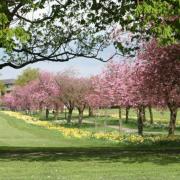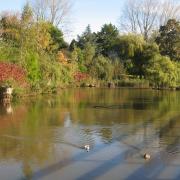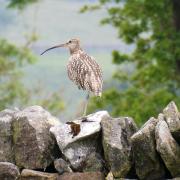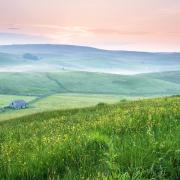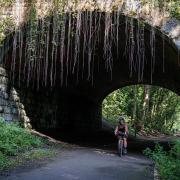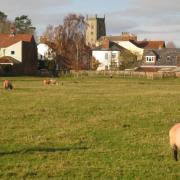Rachel Massey is the founder of Nature Fix and Other Ways to Walk established to support people’s mental health through nature. A qualified mindfulness instructor, Rachel gives tips on 'finding magic in the mundane'
My first piece of advice is not to wait for a ‘perfect’ moment like a brief encounter with a seal while at the coast. It’s actually more important to find the magic in the mundane. The wellbeing benefits to nature are much simpler to find daily than we might think. They can be noticing the changing colours of the sky or the sounds of rustling trees. There’s evidence that shows that intentionally accessing nature in a quality way boosts mood and improves wellbeing.

And it’s not about the amount of time. You may want to walk, sit, look out of your window or immerse yourself in an outdoor space. Whichever way you prefer to access nature, I’d suggest making a note of three things you notice each day. This can be whatever feels good to you. Soak in and experience the fullness of nature: sights, smells, temperatures, sounds.
Right now, look for the signs that the world is turning towards spring. This is happening all around each of us every single day and can be accessed no matter where you live. In cities, notice the sprouts of new green shoots pushing through urban landscapes, the blue skies appearing and the flower boxes changing; in more rural areas, look for new life emerging, whether that is fox cubs or blossom on trees.
Via Nature Fix and Other Ways to Walk sessions, I guide people to notice and appreciate nature. But beyond that, to cultivate curiosity and interest, wherever it creeps in. Nobody has to be an expert in the great outdoors, this is about a sensory experience which fulfils a connected emotional feeling with the earth and nature.
What to look out for/notice in Spring
From March onwards, things change so quickly. Looking often and noticing those changes is a really healthy habit to form. It’s so helpful to our mood too as by this stage in the year, we can often have a depleted feeling because we’ve had dark, cold winter days.
The birdsong is always amazing. Even in the most built up, urban areas, you’ll get a beautiful robin singing its fluting, gorgeous birdsong. Bird migration can also lift spirits, as at this time of year geese start to take to the skies in their droves to return to cooler climes for the summer and the sound and sight of that beginning is a sign of the warm weather to come.
We may also notice the white and pink blossom starting to appear on the trees or daffodils appearing on verges and flower beds, a welcome source of nectar for emerging bees and butterflies. Taking time to notice other trees changing, such as the oak tree, which has flowers appearing at this time of year, is also a nice change to look out for. Try and pay attention to the details of other deciduous trees and you may find some unusual blossoms.
It’s encouraging to see new life as everything transforms very fast in Spring. It’s one of my favourite times of the year because there’s a great sense of renewal as we head into longer days and nature reacts in abundance.
Looking for nature changes in neighbourhoods and why doing so helps improve mental health and wellbeing
I’d like to set people a challenge to help them see things in their neighbourhoods more often. When going about daily life, whether that is on the school run, nipping to the postbox or taking a dog out for a walk, they can count or at least notice the various shades of green. It’s a lovely thing to do in spring because the greens are often vibrant, fresh and bright against the older colours of the plants and trees that retained their leaves over winter.
You can also welcome feelings of joy when watching birds on a birdfeeder, which is again something that can be done in a park, a garden or further afield. A study recently showed that in a group of people who did this, anxiety levels dropped by 20%, which shows a significant benefit to health by doing this one simple activity.
Speaking from personal experience, being in nature helps me to relax. If I can get outside, I have a sense that I am part of something bigger and this helps to put things in perspective, which in turn slows my thoughts down and makes things feel clearer in my mind.
There is an overwhelming amount of evidence now that accessing nature regularly is proven to lower stress, boost the immune system and increase a sense of purpose in an ever-hectic world. An overwhelming 90% of Nature Fix membership referrals wanted to improve their mental health when they signed up. On average they scored their life satisfaction at 3.6 out of 10 before joining, which is half the national average, and all have reported back that this has hugely improved since.
One member, Jean, reflected on the change she’s experienced since accessing Nature Fix. “My depression has lifted after a long scary nine months. Nature Fix has helped me feel connected. Nature is where I can breathe, feel free and relaxed.”

Some of my favourite locations to visit in Yorkshire during spring
Marsden Moor is one of my favourite places in spring. There’s the potential to hear snipe birds drumming and they put on a wonderful display at this time of year. If you’re lucky you may spot rare mountain hares too, which start to moult into their brown summer coats in the Spring.
My local woodland in Holmfirth is brilliant. I can go throughout the seasons and notice so much. I recently revisited a spot where there is a woodland swing and it gave me a sense of freedom playing on that for a while and looking up to the surrounding trees. The outdoors should provide fun as well as time for reflection. Bluebell woods from May onwards are a vibrant haze of blue and the native ones have a heady, strong smell. There’s a lovely display of them at the Yorkshire Sculpture Park I’d recommend.
I’ve been running green prescribing sessions at Cannon Hall in Barnsley too, taking small groups of people around the grounds to embrace nature and help with their physical and mental health. The walled garden’s pear collection at Cannon Hall is nationally significant and lovely to visit in Spring.
The benefits of embracing nature in all its forms, all seasons
In recent years green prescribing has become more widely utilised, as many health and care professionals recognise the significance of being outdoors to mental and physical health; which in turn has led to programmes becoming available for people to access support. This is fantastic progress and a compelling case for nature’s ability to have a positive impact on lives across the country and throughout the year.
Now we need to continue on this trajectory and ensure that everybody can access nature and be supported to do so. There have been heightening levels of stress, anxiety and stress over recent years as we’ve all had a lot to contend with. But finding the small, frequent pleasures in nature every day is a connection we can all share to combat this. And it’s humbling to be able to do so right here in Yorkshire.
About Nature Fix
Nature Fix is an online platform designed to reduce stress by connecting people with nature from the comfort of their own homes. It aims to bring the benefits of connecting to nature regularly to those who are unable to get into the great outdoors. Underpinned by science, the monthly membership platform shares the latest evidence from academics and researchers; guided meditation videos in nature; updates on what’s happening in the natural world; and techniques to help people connect with nature regularly.
otherwaystowalk.co.uk/naturefix








